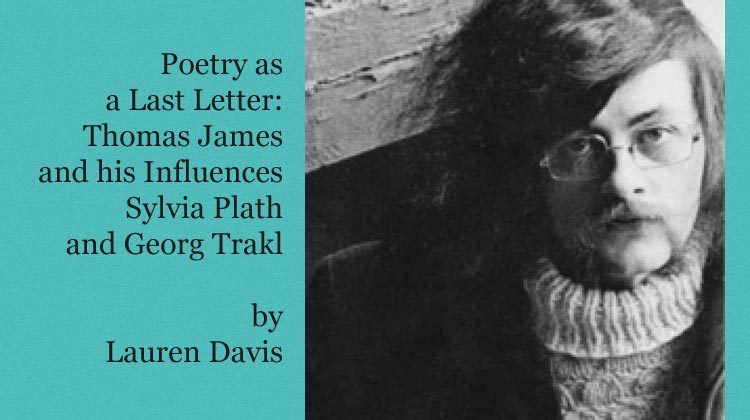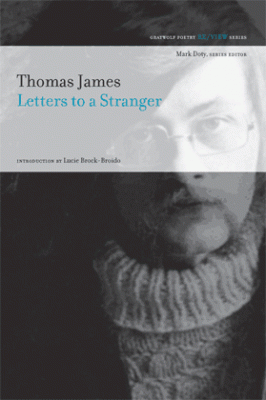
Buried in Joliet, Illinois, lies Thomas Edward Bojeski. He died young at the age of twenty-seven on January 7, 1974. The public and his family disagree on the cause. One says murder. The other says suicide. He was born and raised in Joliet, working varied jobs such as a night watchman and a school teacher. His parents died within ten days of each other two years before his death, in 1972. He was openly gay in a society that still clung to their prejudices. And on top of this he wanted, badly, to be a poet, even adopting his mother’s surname, “James,” to replace “Bojeski” because he considered “Bojeski” “too unpoetic.” The odds were not in his favor, but he was, in many ways, successful. He received the Theodore Roethke prize in 1969, and his poems appeared in publications such as Poetry and the North American Review. When he was twenty-six, in 1973, Letters to a Stranger was released by Houghton Mifflin.
Despite this, his book was largely ignored, and it almost did not make it into existence. He was mocked by a critic as a “pale Plath” in the only known review of Letters to a Stranger before his death. The book entered the world as James’s death neared, and after his death, Letters to a Stranger went into obscurity, though an underground following Xeroxed, studied, and taught it. It would be thirty-five years later, in 2008, that the book was republished.
The story behind the book’s resurrection is extensive, fueled by the dedication of a handful of people that believed in Thomas James’s genius and importance. The poem “Mummy of a Lady Named Jemutesonekh,” out of the book American Poetry Anthology, was taught by Richard Howard at the Writing Seminars at Johns Hopkins. In 1977, the poet Lucie Brock-Broido, a student in that class, heard it, and fell for James’s talent. She searched for a copy of Letters to a Stranger for four years. She finally found one copy in the Carnegie Library on Forbes Avenue in Pittsburgh. It had been checked out only once, on July 28, 1977. She stole the copy and began to teach it at Harvard, then other institutions, including the Bennington Writing Seminars, in violation of copyright.
Brock-Broido was not satisfied, though. She wanted to know more about James. All of his family had died, except his sister, Lynn. Brock-Broido began the twenty-year search for her, not knowing her maiden name. In 1993, one of her students, the poet Mark Wunderlich, suggested they search for the man who took James’s author photo, Gil Ross. Brock-Broido phoned him and he said he knew nothing other than James was dead, but he suggested she find a woman named Kathryn Smith.
When Brock-Broido phoned Smith she seemed bewildered, then hostile, then she burst into tears. She said many incidents surrounding James and his work were painful, sometimes violent. Months later, Smith was diagnosed with cancer. She stayed with Brock-Broido in Cambridge while she received treatment. Smith gave her the name of James’s oldest friend, Ron Thelo. They phoned him that night, and his lover returned the call saying they must write instead. Kathryn Smith died. Then in 1994, Brock-Broido wrote to Thelo. She did not hear back, so she phoned him exactly four months later. She spoke to his lover again. Thelo had died also. But his lover provided James’s sister’s name, Lynn Fisher.
Brock-Broido had finally found her. Fisher was mistrustful at first, but eventually warmed to her, and agreed to meet with her in Joliet. Fisher lived in the same home James had grown up in. His room was downstairs, where he slept on a hide-a-bed couch, the same bed where he died. Fisher showed her James’s paintings and drawings. She explained he sometimes signed his work as “TOMB,” for “Tom B.”

Later, Mark Doty, series editor of The Graywolf Poetry Re/View Series that brings books of contemporary American poetry back into print, finally reprinted Letters to a Stranger in 2008. Soon after, three uncollected poems were also published in High Chair Poetry. The public finally had easy access to Letters to a Stranger, a book that refused to be buried and forgotten.
Thomas James, thanks to Brock-Broido, Doty, and others, metaphorically came back from the dead. He rose like the mummy in his poem “Mummy of a Lady Named Jemutesonekh.” It reads in part:
Hands touched my sutures. I was so important!
They oiled my pores, rubbing a fragrance in.
An amber gum oozed down to soothe my temples.
I wanted to sit up. My skin was luminous,
Frail as the shadow of an emerald.
Before I learned to love myself too much,
My body wound itself in spools of linen.Shut in my painted box, I am a precious object.
I wear a wooden mask. These are my eyelids,
Two flasks of bronze, and here is my new mouth,
Chiseled with care, guarding its ruby facets.
I will last forever. I am not impatient—
My skin will wait to greet its old complexions.
I’ll lie here till the world swims back again.
Perhaps James knew, on some deeper level, that he could, like a mummy, be preserved in his poetry, his pages wrapped tightly around him like linens. But James, in his life and death, unlike his Lady Jemutesonekh, did not receive such opulent grooming. As said before, Joliet was not a place where dreams typically came true. It was a place of poverty and crime. He apparently never attended a writing workshop, and he was not part of the established poetic scene. He had no Ivy League education, instead starting out at a community college. He did, though, have the poet Lucien Stryk as a mentor.
James had contacted Stryk after Stryk’s publication of his book The Pit and Other Poems in 1969. Their relationship became crucial to James’s growth as a writer. Stryk suggested who he should read. He pointed out his flaws, such as overwriting and falling into conventional patterns. And he pushed him, most importantly, to tell the truth. He asked him repeatedly, “What is it you’ve been hiding from? …The talent is there. Now what is it you really feel has been left out?”
What James struggled with was his will to live. The death of Thomas James is widely accepted as a suicide. He was found in his room with a gunshot wound from a .45 caliber gun. He had called his sister the day before to say goodbye, and the day of his death he called his mentor Stryk. As Stryk tells it, James asked to see him right away. He seemed anxious, tense. Stryk told him to come over, then waited hours for him to arrive. James never showed. Shortly after, Stryk heard of James’s death.
Still, his family disagrees. His brother-in-law says, “Tom was right-handed; his wound was on the left side of the head. How a right-handed guy could reach is bullshit. He was shot on his bed. There was someone else involved.” What everyone in his family has conveniently forgotten, though, is James’s suicide note. No one supposedly remembers what it said, or where it is.
But Letters to a Stranger makes a strong case for suicide, or at least the wish for death. The book references death like a priest references God. His vocabulary is dark. His poems are unapologetically ominous. Titles include “Luncheon with the Hangman,” “Snakebite,” “Dissecting a Pig,” The Hostage,” “Longing for Death,” and “Laceration.” In his uncollected poems, he has one simply titled “Suicide.” As a reader, I do not need James’s suicide note. I have his book, which to me acts as the same thing.
Some of James’s poetic influences also had similar biographies. Consider Sylvia Plath. James was influenced so much by her that the poet Sandra McPherson called him “Mr. Plath,” and critic Jared White of Harp & Altar also called him “a warmed-over Plath-lite.” Both poets Sylvia Plath and Thomas James succumbed to depression and suicide at early ages and stages in their careers. What binds them more, though, is James’s admiration and romance with Plath’s book Ariel. As Brock-Broido writes, Plath’s “genetic dispositions are all over” the late Thomas James’s book. He wrote with his own distinct voice from his own distinct history, but a comparison to Plath can be enlightening. Many compare James’s “Mummy of a Lady Named Jemutesonekh” to Plath’s “Lady Lazarus.” Her influence proves unmistakable. Many of her other poems, put side by side with Letters to a Stranger, stand out as theoretical provocations or prompts for James.
Georg Trakl was also a large influence for Thomas James. The Austrian poet became accessible to the English speaking reader through the translations of James Wright and Robert Bly in 1961. Trakl was important to James’s mentor Lucien Stryk. Stryk translated him also, making him part of his dialogue with James. Trakl’s thumbprints exist on Letters to a Stranger just as Plath’s. Trakl used repeated imagery and vocabulary in his books. He leaned towards bleak images. James also used an obsessive, bleak vocabulary. In fact, I counted the word (or variations of the word) “dark” thirty times in Letters to a Stranger before I lost track. I counted variations on the word “death,” too, at twenty-one times before losing track. And the biographical details of Trakl’s death are also alarming similar to James’s. Trakl wrote from an early age, but in just two years, his final years, Trakl wrote the poems that made him one of the most original and significant German-speaking poets. He died of a cocaine overdose at the age of twenty-seven, the same age as James at his death. It is commonly agreed that the overdose was a suicide, mostly because Trakl had a history of mental illness, had previously tried to kill himself more than once, and he suffered a mental collapse before his death brought on by trying to relieve the pain of ninety seriously injured soldiers put under his care. He watched one of them kill himself, and watched deserters being hanged.
It is important to remember, though, that the tragic biographies of James, Plath, and Trakl should not overshadow their art and their genius. Consider the words of Jared White from Harp & Altar:
The suicide or early death of any famous poet works to create an aura around the writing that accentuates certain aspects of it—the obdurate, the mysterious, the otherworldly—that can either distort the poet’s work…or burnish it. With Thomas James, there is a case to be made for both possibilities, especially since this is very much a first book, with all of the excitement and all of the pitfalls that first books often reveal: noisy echoes of poetic influences, a surplus of diligence and precocious energy, the tendency toward reiteration, pressure, dogma, defensiveness, control. Without a context of later writing in which to situate the poems in Letters to a Stranger, so concerned with mortality and masochism, it is easy to read them as suicide note poems, lyrical treatments of James’s own obsessions, depressions, frustrations, despairs.
But nothing is accomplished when Thomas James’s, or any other poet’s, death eclipses their lives. Fortunately, we have poems that, as long as we keep them in print, will keep a part of their brilliance thriving. Mark Doty, in response to “Mummy of a Lady Named Jemutesonekh,” said “Jemutesonekh speaks from the perfection and stasis of death, outside of change. In a way she’s a figure for the work of poetry—in which feeling, perception, thinking are given form and stilled within the frame of language a poem creates. To become a poem, to become a voice, is to last, if you’re lucky. And the poems of Thomas James are proving to be enduring acts of preservation.” Doty is right. Whether James meant for Letters to a Stranger to act as a suicide letter or not, it has made him, in a sense, immortal as long as the reading public allows. He will not disappear, even in death, unless we let him. James is not done teaching us about talent, about honesty, about beauty. Let us keep him alive.




Robin Rule says
Thank you William Patterson. So good to know you ordered not one, but two copies of Letters. It’s on my wish list. Good to have not only Davis’ recommendation, but yrs as well. I look forward to purchasing it in a few months of saving!
With Ink, Robin Rule
William Patterson says
I’d never heard of Thomas James before reading this fine piece in ‘Empty Mirror’. After reading this review, I ordered a copy of “Letters”, and was about mid-way through reading it when I inadvertently left it on an airplane seatback in Newark, New Jersey. After kicking myself for being so careless, I immediately ordered a replacement copy. Days later, I imagined a stranger perhaps finding this book and enjoying it as much as I had. Perhaps some irony in “Letters to a Stranger”.
Essays like this are why I am always excited to see the latest from Empty Mirror popping up in my inbox.
W.E. Patterson
Robin Rule says
Thank you for this outstanding essay on Thomas James by Lauren Davis. Empty Mirror not only keeps the Beats alive, but it also reminds us of the lesser known poets who have contributed much to the heart of poetry.
Robin Rule